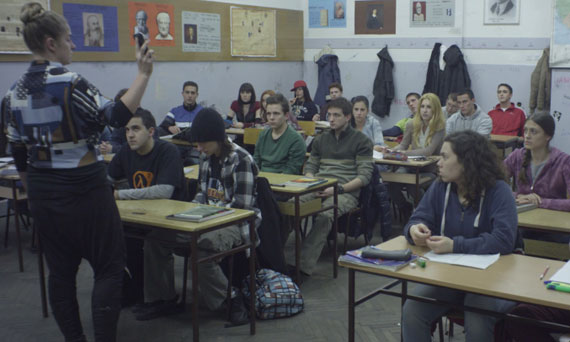By Asha New
Directed by Stevan Filipovic
Stevan Filipovic’s Next to Me is a Serbian film about a high school teacher, Olga, who is assaulted one night after her husband releases a controversial art exhibition. She later finds out the perpetrators were her own students and so confiscates their phones and locks them in the school building, causing an almost Breakfast Club-like response. To outline the similarities between these two films: a group of students are forced to stay in their school with no obvious communication to the outside world, and eventually, with the lack of anything else to do, they begin to talk. However, there are still divisions between the two features; Next to Me has a much larger class of students with whom, although cliques between them are still apparent, end up discussing topics which are relevant to the current country of Serbia and the attitudes of the many different people who live there, so viewers from all generations can in some way relate to the different areas touched upon in the film.
There is primarily a natural focus on the teacher, Olga, and her position. She is presented as a good teacher, trying to engage her class into being more invested with their education. The fact that she’s trying to fund a school trip without definite approval from her superiors, in an attempt to work with her generally lethargic and unenthusiastic class, provokes respect for her from the audience. With this set up, it is easy to see the attack as a kind of “˜betrayal’ against Olga’s work for the class and immediately the viewer has a more hostile attitude towards the classmates.

Next to Me is never about the attack on Olga; there is no mystery and the perpetrators are not hidden from the audience. Instead, it is quite obvious from the beginning who they are. The film is primarily about the students that are stuck in their school, and the interactions between them. The shift of focus from Olga to her students serves as a seamless transition between different generations and therefore contrasting viewpoints of the world. It allows us to naturally see the situation from the outlook of a range of students and to be able to understand their varying attitudes and opinions.
The feature manages to touch on many different topics, without being overtly focused on one particular point. This way it is able to explore aspects of sexuality, insecurities, popularity, reputation and family history, to name a few, and their role in today’s society. Director Filipovic is able to juggle these diverse elements mainly thanks to the talent of his actors. Although the cast is large, they each invite specific and equal focus, so the audience can recognise and become attached to a multitude of individuals. We’re able to see the world from many different perspectives, depending on each character’s individual past and opinions.
It may help when watching this film, to have some knowledge about the history of Serbia and Croatia. It is watchable without, but it can leave the audience a little lost as they may not know the context of the exhibition or how it provoked the attack. What is clear and obvious to the characters, may not be to the viewer. Regardless, the film is still extremely interesting and entertaining to watch. The talented and relatively unknown actors portray a believable, if slightly stereotypical class atmosphere, with engaging and varied characters. They tie in nicely with the wider social implications that the film touches on. Focusing like this, on a small select group of people, allows the audience to recognise these different opinions and personal outlooks, which can then be applied on a larger scale in relation to the current events of the country.
To bring Next to Me to your region, cast your DooVote here!
Recommended Viewing on FilmDoo:
(UK & Ireland only)








